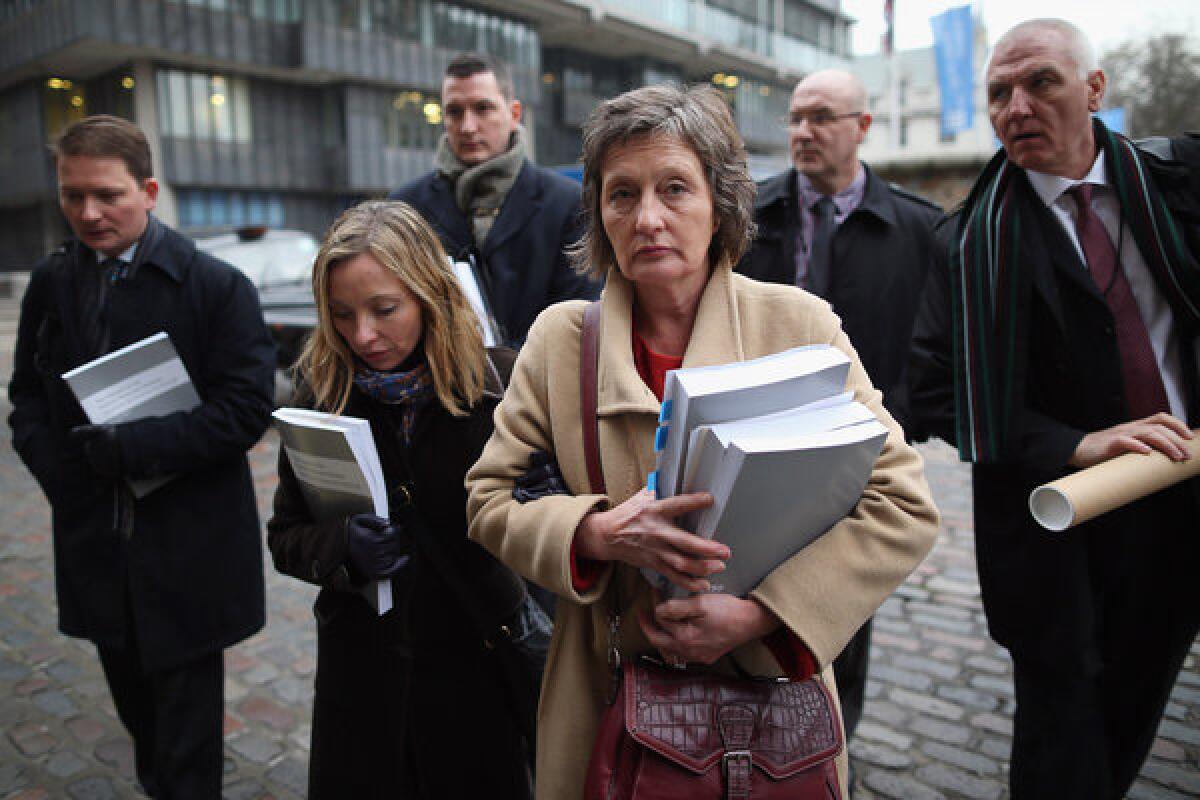Report: British agents ‘facilitated’ killing of Belfast attorney

- Share via
British police and army agents aided in the assassination of a Belfast attorney in front of his wife and three children more than two decades ago, but there was no “overarching state conspiracy” to kill him, say the findings of an independent investigation released Wednesday.
Patrick Finucane, a lawyer who defended Irish Republican Army suspects, was slain in his home by militants from an outlawed loyalist group. The 1989 killing has been one of the most bitterly disputed slayings of the Northern Ireland conflict, with questions swirling around the part played by British agents who were supposed to be foiling terrorism.
The report says British agents who had infiltrated the Ulster Defense Assn. could have prevented the attack on Finucane, but instead “actively furthered and facilitated his murder.” Afterward, “there was a relentless attempt to defeat the ends of justice,” it says.
British officers probably suggested Finucane as a target to the loyalists, former United Nations war crimes investigator Desmond de Silva wrote. One British agents passed along a photograph of the attorney and probably gathered information to help target him; another provided a pistol for the attack, though he did not appear to know that Finucane was the target, De Silva concluded.
The vast majority of information available to the loyalist militants came from “extensive ‘leaks’ ” from British security services, the report says. Army and police forces knew beforehand of “a series of planned UDA assassinations, yet nothing was done … to seek to prevent these attacks.”
In one striking episode detailed in the report, British police dropped a murder investigation of a man who admitted driving the gunmen to the Finucane home and instead recruited him as a British informant. The police recording of his words disappeared, “another deliberate act designed to obstruct the investigation into the murder,” De Silva found.
Yet the investigation concluded there was no evidence to suggest that any government ministers were aware of how the British agents were abetting the crime or knew of the killing beforehand.
Although several investigations of the killing had been launched, yielding some limited information on the case, the British government sought the independent review “to expose the truth as quickly as possible,” Prime Minister David Cameron said Wednesday.
The “shocking levels of state collusion” are “totally unacceptable,” Cameron said, offering his apology to the Finucane family on behalf of the British government.
The Finucane family and Irish Catholic leaders were not impressed by the report, saying they found it hard to believe that higher government officials were unaware of what was happening. The British police units implicated in the report have since been dissolved. Geraldine Finucane, who was injured in the attack that killed her husband, told reporters it was a “whitewash.”
“At every turn, dead witnesses have been blamed and defunct agencies found wanting,” she was quoted as saying by the Associated Press. “Serving personnel and active state departments appear to have been excused.”
Only one person was convicted in connection with the killing and freed under a Northern Ireland peace accord. Irish Prime Minister Enda Kenny and other Irish leaders have joined the Finucanes in calling for a public inquiry that would require former officials to testify. The report released Wednesday drew on existing government papers from previous investigations.
Finucane was killed weeks after a British government minister complained in the House of Commons that some lawyers in Northern Ireland were “unduly sympathetic to the cause of the IRA” after being briefed by British police that some attorneys were “effectively in the pockets of terrorists.” The minister, Douglas Hogg, had been given a police profile of Finucane.
There is no basis to believe that Hogg meant to encourage attacks on attorneys, De Silva wrote. But “in the febrile and violent context of Belfast in 1989, loyalist paramilitaries did indeed pick up on the comments,” unwittingly putting lawyers such as Finucane at risk.
ALSO:
U.S. official: Syrian government fired Scud missiles at rebels
North Korea still a long way from a reliable weapon, experts say
Bosnian Serb general found guilty of genocide, sentenced to life
More to Read
Sign up for Essential California
The most important California stories and recommendations in your inbox every morning.
You may occasionally receive promotional content from the Los Angeles Times.











